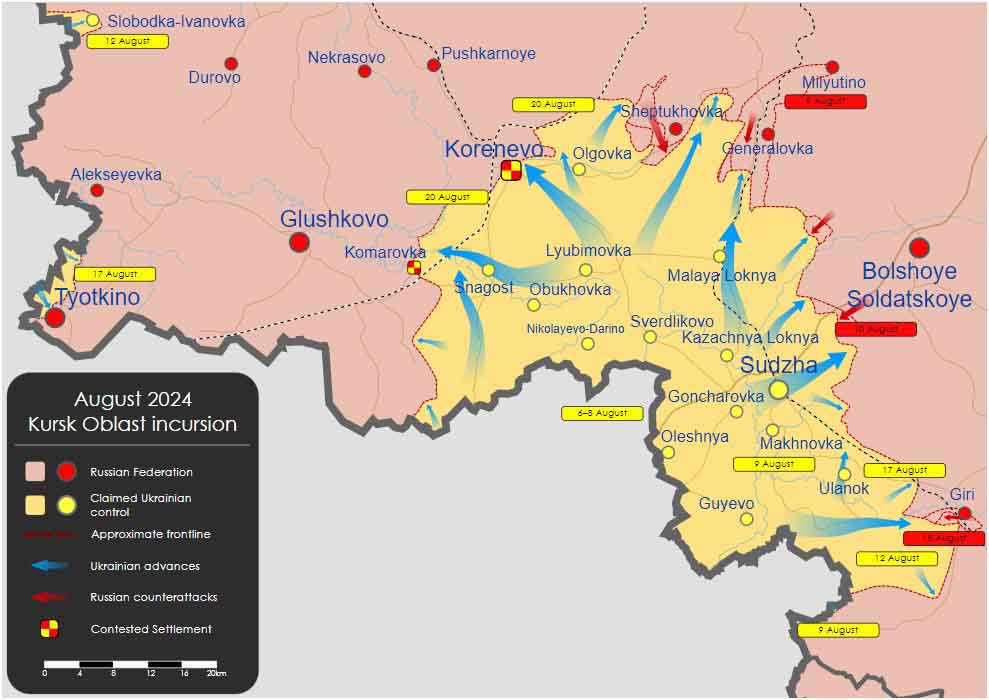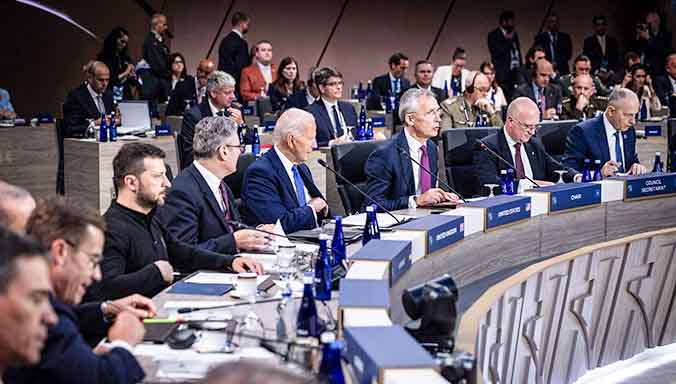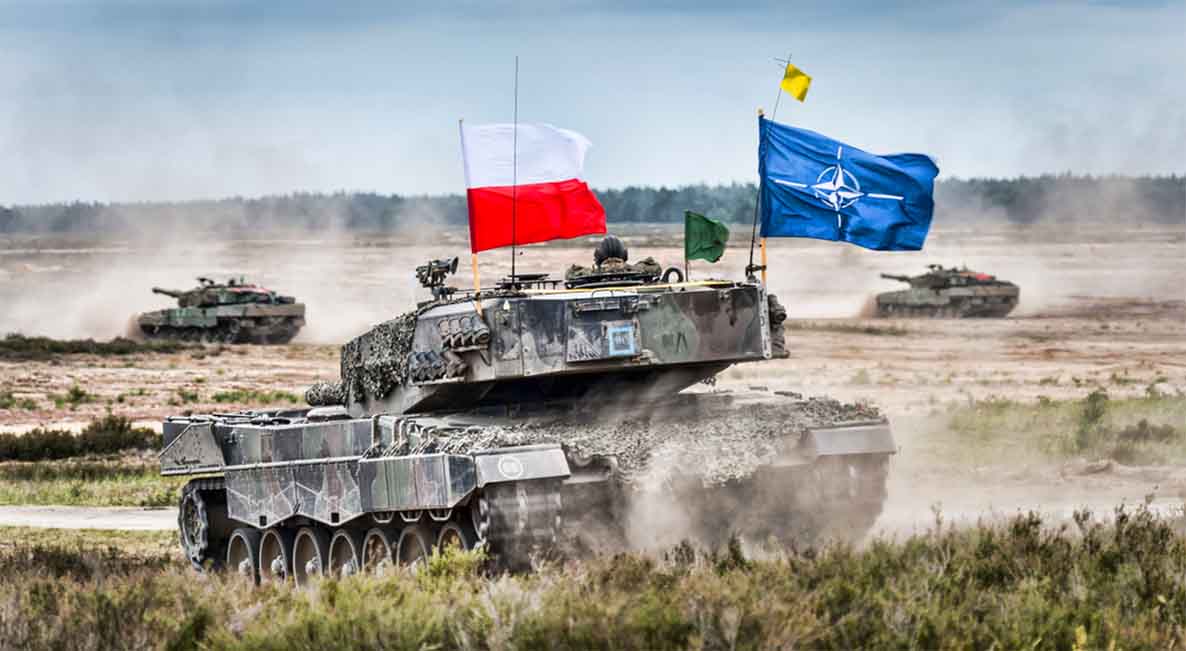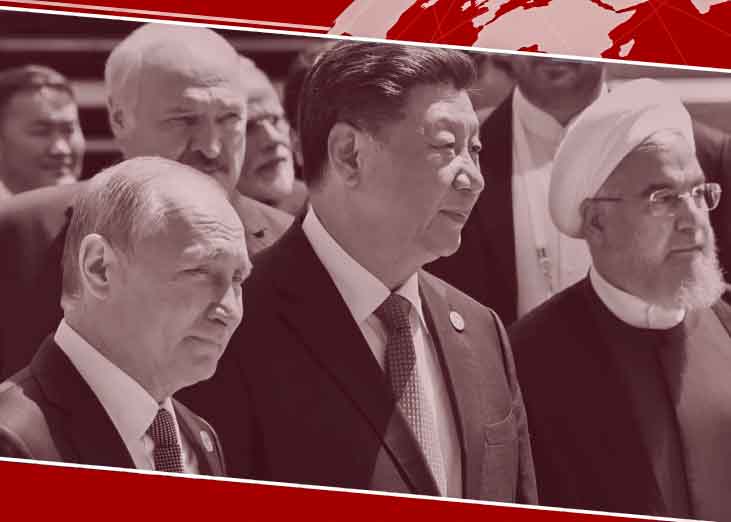See also: Plan for Victory in Ukraine - Part II
A few days ago, a joint report of the Committee on Foreign Affairs, the Committee on Armed Services and the House of Representatives Permanent Select Committee on Intelligence, prepared late last year, was published, which aims to answer critical questions about the attitude of the US and allies towards Ukraine and — for the first time on the official forum — presenting the victory plan. The authors of the report entitled "Proposed Plan for Victory in Ukraine" are — it should be emphasized — the Republican chairmen of the above-mentioned US Congressional committees: Representatives Michael McCaul (R-TX), Mike Rogers (R-AL) and Mike Turner (R-OH).
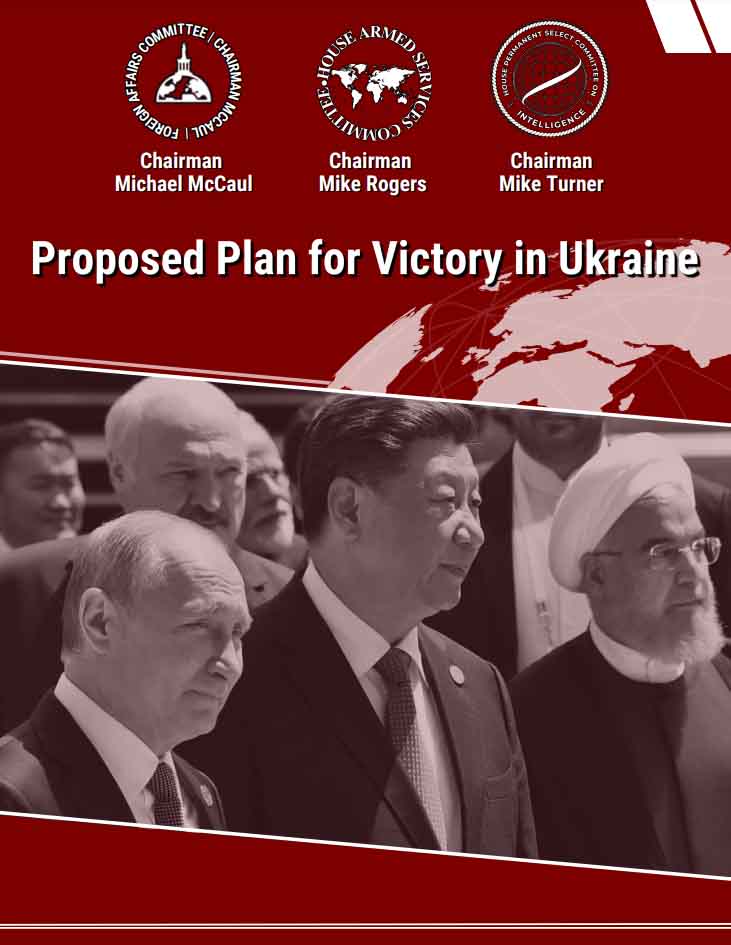
Cover of the US Congress report. (Source: US Congress)
Why is support for Ukraine needed?
Many people in America wonder why the US should support Ukraine. The Congress' report is, among other things, an attempt to answer this question. It examines a number of reasons why a Ukraine victory in an unprovoked Russian-led war is in the U.S. national interest. Republicans in Congress also want to ensure that aid for Ukraine is not a "blank check" and to force the administration to deliver key weapons systems to Ukraine.
The Axis of Evil
Russia and an alliance consisting of China, Iran and its proxies (such as Hamas, Hezbollah, and Houthi militants), and North Korea are working together to undermine American interests around the world. Their goal is to weaken the US economy, break key alliances and establish a new totalitarian world order. Not since World War II has the United States faced a greater challenge.
Russia's attack on Ukraine — the largest land invasion in Europe since World War II — "is eerily reminiscent of Poland of 1939." It became a kind of test whether the United States and the rest of the free world — i.e. the so-called collective West — will be able to oppose unjustified aggression from an authoritative regime, or — as in 1939 — will they try to appease the dictator.
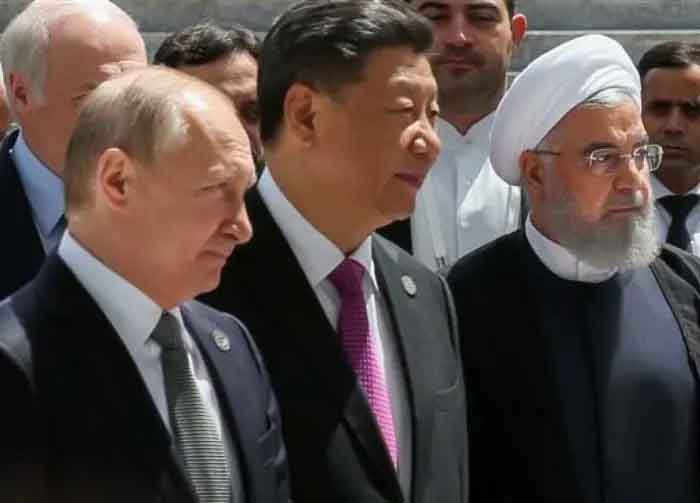
Putin, Xi, Khamenei, Lukashenko (Source: president.ir)
Authoritarian opponents of the US carefully watch what is happening, what the West's reactions are, and draw conclusions for themselves. A possible Putin victory in Ukraine would usher in a much more dangerous phase for the United States and its allies and partners.
Ukraine needs to be supported
As the authors of the report point out, you should not be fooled: US support for Ukraine is not charity. After President Biden's disastrous withdrawal from Afghanistan, which was a fiasco like a second-Saigon, supporting Ukraine in defeating Putin's invading forces is crucial to restoring American deterrence in Europe, the Middle East and the Indo-Pacific region. The threat is real and "Conceding to dictators does not work" — this is how the report begins.
It describes the Biden administration's current policy towards Russia, China, Iran, North Korea, Cuba and Venezuela as ineffective. “Putin only respects strength.”
Biden is mishandling the worst war in Europe since World War II. His weakness failed to deter Russia’s full-scale invasion of Ukraine, continues to prolong the war, and risks inviting further aggression from America’s adversaries.
The strength of American deterrence is weakening. Emboldened by the disastrous withdrawal from Afghanistan and Putin's decision to launch a full-scale invasion of Ukraine despite American warnings, America's adversaries have become increasingly willing to challenge U.S. national security interests around the world.
China
The authors emphasize that President Xi is also escalating tension in the Indo-Pacific region.
Just weeks before beginning his full-scale invasion of Ukraine, Putin met with Chairman Xi to announce a “no limits partnership” between Russia and China. Since then, China has provided significant diplomatic cover for Russia’s brutal war of aggression, including by parroting false Russian narratives justifying the war.
Everyone is aware that China is closely monitoring the events in Ukraine.
Japanese Prime Minister Fumio Kishida even warned that "Ukraine may be the East Asia of tomorrow." Discontinuing U.S. support for Ukraine would signal to Xi that U.S. resolve may be broken and could have disastrous consequences for efforts to stop the invasion of Taiwan.
China has also provided Russia with access to satellite navigation, thereby aiding Russian attacks in Ukraine, and has served as a backdoor through which Russia acquires technologies and so-called “dual-use” products, such as chips, to power its war machine.
Near East
Furthermore, we are now also dealing with a full-scale war in the Middle East (and an attempt to block shipping in the Red Sea, which the authors of the report could not have known about yet) which threatens to destabilize the entire region. Russia refused to condemn the Hamas terrorist attack on Israel and sponsored a UN resolution calling for a premature ceasefire.
Official Hamas delegations visited Moscow three times in 2023 — including immediately before and after the terrorist attack on Israel on October 7. A coincidence? I don't think so.
Russia has been selling advanced weapons systems such as missiles and air defense systems to Iran, despite concerns about their potential use in regional conflicts or against civilian targets. Both countries engage in joint military exercises, potentially sharing tactical knowledge. They also cooperate in the exchange of intelligence information and "combating terrorism." Some fear that Russian nuclear expertise could indirectly benefit Iran's program.
Russia and Iran often vote the same at the United Nations and other international forums when opposing Western-backed resolutions or sanctions. Both countries share geopolitical interests in opposing U.S. influence in the Middle East and challenging the existing global order.
North Korea
Russia receives ballistic missiles and artillery shells from North Korea, which are used in Ukraine. There are also growing concerns that Vladimir Putin will share advanced satellite technologies and weapons, thus supporting North Korea's military program.
Both Russia and North Korea have condemned Western sanctions and international pressure, often supporting their votes on the UN Security Council. This support is an attempt at mutual political legitimization on the world stage.
Despite international sanctions, there are reports of ongoing trade and economic cooperation between the two countries. This includes energy exports from Russia and labor exports from North Korea.
Indecisiveness of the US Administration
Republican representatives point out that
Biden did not impose a single significant sanction on Russia as it amassed troops around Ukraine in the lead-up to the invasion, nor did he provide significant military assistance during those critical months. In fact, he rolled-back and failed to enforce Trump-era sanctions on key Kremlin projects such as Nord Stream 2. This weakness forfeited the last opportunity to deter Russia and prevent this costly war.
And they further say that
It is no coincidence that Russia invaded Ukraine a mere six months after Biden’s shameful surrender to the Taliban and humiliating withdrawal from Afghanistan. Putin sensed American weakness and believed he could seize Ukraine without a significant response from the West. The disastrous withdrawal and faulty timelines drained American credibility globally and led to U.S. warnings of an impending Russian invasion of Ukraine falling on deaf ears.
The authors of the report unequivocally accuse the Biden administration of failing to oppose Russian preparations for an invasion, unblocking the sanctions on Nord Stream 2 imposed by the Trump administration, and neglecting to support Ukraine with effective weapons.
Even after Russia's annexation of Crimea and occupation of parts of eastern Ukraine in 2014, the Obama-Biden administration refused to provide material assistance to Ukraine, signaling to Russians that the US had no confidence in opposing their aggression. Decisive action at the time, say Republican congressional representatives, could have discouraged Putin and prevented a costly invasion.
If the US administration can't stop the Taliban, Iran, Korea, or Putin's Russia, how will it be able to stop Xi Jinping? This is the question now being asked by all of the United States' allies from the Atlantic, through the Indian Ocean, to the Pacific.
As long as necessary?
The authors of the report emphasize that Biden's mantra of supporting Ukraine "as long as it takes" is a strategy doomed to failure. The United States will not be able to maintain it due to costs.
Republicans believe that President Biden should present a credible victory plan as soon as possible and arm Ukraine with the necessary weapons.
Since the first day of the war, Biden’s debilitating hesitation to provide critical weapons to Ukraine has delayed a Ukrainian victory. Ukraine needs the longest-range variant of ATACMS, F-16s, and sufficient quantities of cluster munitions, artillery, air defenses, and armor to make a difference on the battlefield. This delay is costing Ukrainian lives and the American taxpayer.
The Plan of Victory
The authors of the report present their plan for victory in just three points:
- Providing critical weapons to Ukraine at the speed of relevance,
- Tightening sanctions on the Putin regime,
- Transferring frozen Russian sovereign assets to Ukraine.
So the plan is very simple. This is also the first plan of victory, rather than concessions to Russia, presented in the West, which is a significant event. For the first time, representatives of the free world admit the idea of victory over Russia.
The Biden administration has not presented a victory plan so far — it has always been about not provoking Putin, not letting Russia win, yet not letting Ukraine lose, which — it must be emphasized — does not mean victory for either side.
House Republicans believe President Biden should present a credible plan for victory and arm Ukraine with the weapons it needs to win as soon as possible.
This strategy
will ensure Ukraine is able to make the needed advances on the battlefield to force Putin to the negotiating table. If Ukraine doesn’t negotiate from a position of strength, there can be no lasting peace.
I summary, this is a victory plan that includes requiring the administration to adopt a credible Ukraine victory strategy, strengthening existing accountability measures, transferring weapons to Ukraine at an appropriate pace, tightening sanctions and export controls on the Putin regime, and pressuring the Biden administration to galvanize the G7 and the EU to hand over to Ukraine frozen Russian assets worth $300 billion.
A Good Investment
The US military industrial complex has largely withered in the decades since the Cold War. Stimulation of demand for arms by US aid to Ukraine encouraged the industry to revitalize production. In this way, the US has a chance to regain its position to be able to help credibly stop the invasion, be it of Taiwan, or of other allies, including Poland.
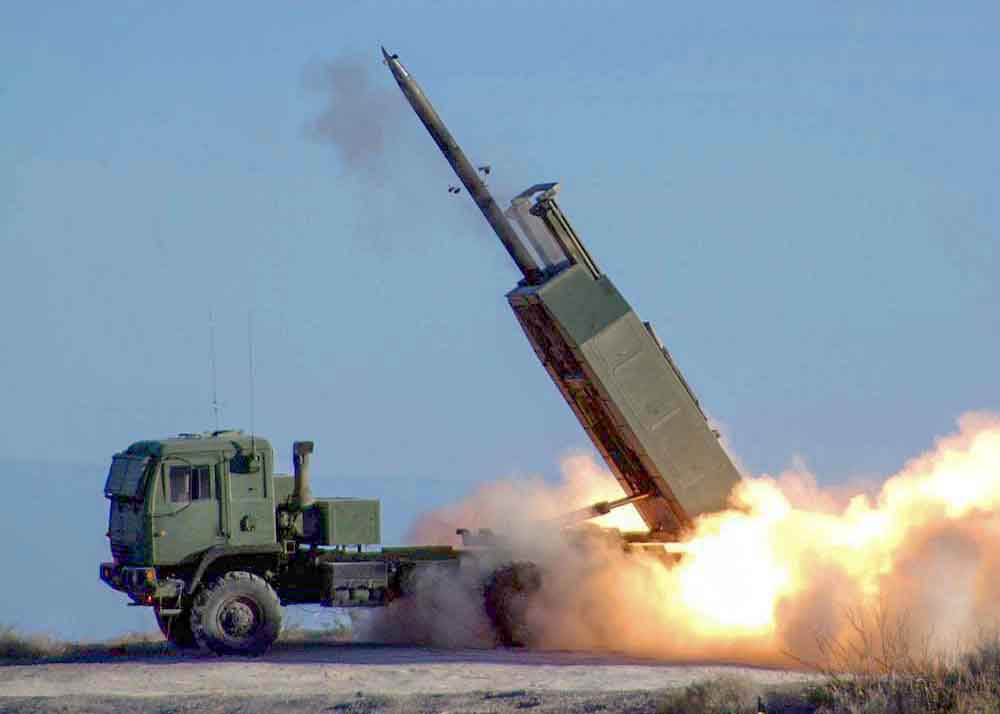
HIMARS missile launcher (Source: Wikipedia)
The U.S. has committed $44 billion in security assistance to Ukraine since the start of the full-scale invasion. That amounts to just 3.9% of our defense budget. With U.S. weapons, Ukraine has significantly degraded Putin’s army, causing almost 300,000 casualties – all without a single U.S. servicemember being put in harm’s way. Defeating Putin in Ukraine now will prevent a Russian invasion of a NATO ally, which would be immeasurably more costly in terms of American blood and treasure.
write the authors of the report.
If the United States abandons our Allies like we did in Afghanistan, we will lose our trust and standing in the world as the leader of the free world. Our adversaries and enemies will be emboldened and empowered and the world will become more dangerous. (...) The United States can carry the torch of freedom, democracy, and human rights, or she can retreat into a false sense of security.
The choice is ours, the time is now, history is on our side. — this is how the report by Republican representatives emphasizes the seriousness of the situation.
See also: Plan for Victory in Ukraine - Part II










